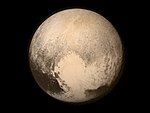astro.wikisort.org - Meteorite
Kepler-445c is an exoplanet orbiting the red dwarf star Kepler-445 every 5 days in the inner edge of the star's circumstellar habitable zone.[3][failed verification] PHL does not consider this planet potentially habitable.[4]
| Discovery | |
|---|---|
| Discovery site | Kepler Space Observatory |
| Discovery date | 2015 |
Detection method | Transit |
| Orbital characteristics | |
Semi-major axis | 0.033427 AU (5,000,600 km) |
| Eccentricity | 0 |
Orbital period (sidereal) | 4.871229±0.000011 d |
| Inclination | 89.91 |
| Star | Kepler-445 |
| Physical characteristics | |
Mean radius | 2.72+0.44 −0.43 REarth[1] |
| Temperature | 362 K (89 °C; 192 °F) [2] |
Physical features
With a radius of 2.72 times that of Earth, it is likely a mini-Neptune with a gaseous composition. Assuming that Kepler-445c instead has the same density as Earth, it would have a mass of 15.9 MEarth, according to the PHL exoplanet density calculator.
| Earth | Kepler-445c |
|---|---|
 |
 |
References
- Mann, Andrew W.; Dupuy, Trent; Muirhead, Philip S.; Johnson, Marshall C.; Liu, Michael C.; Ansdell, Megan; Dalba, Paul A.; Swift, Jonathan J.; Hadden, Sam (2017), "THE GOLD STANDARD: ACCURATE STELLAR AND PLANETARY PARAMETERS FOR EIGHT Kepler M DWARF SYSTEMS ENABLED BY PARALLAXES", The Astronomical Journal, 153 (6): 267, arXiv:1705.01545, doi:10.3847/1538-3881/aa7140, S2CID 119325474
- "Kepler Objects of Interest".
- "Kepler-445".
- "The Habitable Exoplanets Catalog - Planetary Habitability Laboratory @ UPR Arecibo".
На других языках
- [en] Kepler-445c
[es] Kepler-445c
Kepler-445c es el segundo exoplaneta descubierto alrededor de la estrella Kepler-445, en la constelación de Cygnus, a 293,5 años luz de la Tierra.[1] Su detección se confirmó en 2015, después de que el Telescopio Espacial Kepler registrase varios tránsitos del objeto frente a su estrella.[2] Su radio, de 2,51 R⊕, supera con creces el límite establecido por los expertos que distingue a los cuerpos terrestres de los gaseosos. Por tanto, la probabilidad de que se trate de un minineptuno es muy alta.[3][1]Текст в блоке "Читать" взят с сайта "Википедия" и доступен по лицензии Creative Commons Attribution-ShareAlike; в отдельных случаях могут действовать дополнительные условия.
Другой контент может иметь иную лицензию. Перед использованием материалов сайта WikiSort.org внимательно изучите правила лицензирования конкретных элементов наполнения сайта.
Другой контент может иметь иную лицензию. Перед использованием материалов сайта WikiSort.org внимательно изучите правила лицензирования конкретных элементов наполнения сайта.
2019-2025
WikiSort.org - проект по пересортировке и дополнению контента Википедии
WikiSort.org - проект по пересортировке и дополнению контента Википедии


